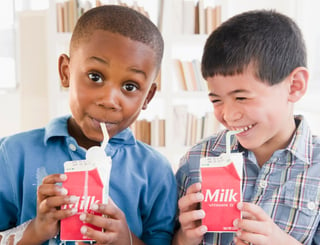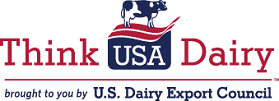-
Life Stages Series: Dairy’s Unmatched Nutrition Helps Children Thrive
By Terri Rexroat September 29, 2017- Tweet
 Nutrition plays an undeniably-important role in child development. A parent’s choice of what foods and beverages to keep in their home goes well beyond choosing healthy options. Their child’s age, stage of development, allergies and intolerances are important elements. In this first piece in a series on how dairy supports different life stages, we are outlining dairy’s role in supporting child development. What better time to explore the benefits of milk and milk-derived ingredients than during the celebrations around World School Milk Day, commonly celebrated the last Wednesday in September each year.
Nutrition plays an undeniably-important role in child development. A parent’s choice of what foods and beverages to keep in their home goes well beyond choosing healthy options. Their child’s age, stage of development, allergies and intolerances are important elements. In this first piece in a series on how dairy supports different life stages, we are outlining dairy’s role in supporting child development. What better time to explore the benefits of milk and milk-derived ingredients than during the celebrations around World School Milk Day, commonly celebrated the last Wednesday in September each year.Introducing whole cow’s milk at year one
Milk is often introduced in a child’s life at a young age. Milk’s nutrient package is unmatched, and its vitamins and nutrients are essential to the health and development of infants and young children. Whole cow’s milk can be introduced once a child turns one. Whole milk provides the healthy fats needed for nerve and brain development in children. To address preconceived notions of saturated fats found in milk, health professionals are reconsidering the role of dairy fats.
Recent studies suggest that consuming whole-fat milk helps avoid obesity and may not be directly associated to the chronic diseases children could develop in the future. To help parents structure a well-balanced diet, two to three servings of dairy each day are recommended in the U.S. and many other countries around the world.
Addressing dairy allergies and intolerances
Unless milk allergies are present, all toddlers and young children should be encouraged to consume milk and other dairy products. Most children with a cow’s milk allergy will develop a natural tolerance by age three, and if possible, the intake of essential amino acids should not be limited in any child’s diet in year two. This is because dairy proteins found in milk, such as whey proteins, have essential and non-essential amino acids. They even stand out among all foods as one of the best sources of branched-chain amino acids to stimulate muscle protein synthesis.
High-quality dairy proteins help give toddlers the strength to walk, develop a healthy bone structure and the brain power to learn speech and language skills. When kids start school, parents often have less direct control over the diets of their children and their protein intake. So not only is it important to keep milk in U.S. schools, it also is important to help children around the world receive the same unmatched high-quality nutrition.
Spreading the access of milk to all children
For areas grappling with poverty, the Dairy for Global Nutrition website highlights research that links limiting dairy in the diets of young children with stunted growth, lower bone density and nutrnd dairy offers the nutrition, flexibility and flavor to be part of the solution in a variety of child-friendlyient deficiencies worldwide. These deficiencies are preventable a foods.
This is a topic close to home for Christie Vilsack who recently spoke at the Dairy Nutrition: An Engine for Economic Growth event, May 10-11 in Boise, Idaho. She told stories of stunting, malnutrition and learning disabilities in children due to a lack of nutrition. Watch her video message on how the U.S. dairy community is collaborating to find ways to reduce hunger in school-aged children by enhancing education and adding more dairy proteins to easily accessible items.
U.S. dairy products are available globally to help parents achieve the most nutritious diets to for their children. For food and beverage professionals looking to spread the wealth of dairy, ThinkUSAdairy.org has information on formulating and cooking with dairy ingredients.
Most Popular Posts
Find by Date, Geography and Dairy Product
- September 2015 (6)
- December 2015 (5)
- September 2016 (5)
- December 2016 (5)
- June 2017 (5)
- February 2015 (4)
- March 2015 (4)
- April 2015 (4)
- May 2015 (4)
- June 2015 (4)
- July 2015 (4)
- November 2015 (4)
- January 2016 (4)
- March 2016 (4)
- June 2016 (4)
- August 2016 (4)
- October 2016 (4)
- November 2016 (4)
- February 2017 (4)
- March 2017 (4)
- April 2017 (4)
- November 2013 (3)
- October 2015 (3)
- February 2016 (3)
- April 2016 (3)
- May 2016 (3)
- July 2016 (3)
- January 2017 (3)
- May 2017 (3)
- July 2017 (3)
- August 2017 (3)
- September 2017 (3)
- October 2014 (2)
- August 2015 (2)
- October 2017 (2)
- December 2017 (2)
- July 2020 (2)
- December 2013 (1)
- February 2014 (1)
- June 2014 (1)
- August 2014 (1)
- September 2014 (1)
- November 2014 (1)
- November 2017 (1)
- January 2018 (1)
- February 2018 (1)
- May 2018 (1)
- June 2018 (1)
- July 2018 (1)
- August 2018 (1)
- September 2018 (1)
- October 2018 (1)
- November 2018 (1)
- February 2019 (1)
- March 2019 (1)
- April 2019 (1)
- July 2019 (1)
- October 2019 (1)
- March 2020 (1)
- April 2020 (1)
- June 2020 (1)
- October 2020 (1)
- November 2020 (1)
- March 2021 (1)
- April 2021 (1)
- June 2021 (1)
- August 2021 (1)
- February 2022 (1)
- June 2022 (1)
- September 2022 (1)
- October 2022 (1)
- November 2022 (1)
- February 2023 (1)
- April 2023 (1)
- USDEC Staff (65)
- Kara McDonald (24)
- Terri Rexroat (15)
- John Klees (15)
- Kristi Saitama (9)
- Angelique Hollister (8)
- Vikki Nicholson-West (8)
- Shannon Koski (8)
- Rohit Kapoor (3)
- Keith Meyer (2)
- Moises Torres-Gonzalez (2)
- Amy Foor (2)
- Alan Levitt (1)
- Tom Vilsack, President and CEO (1)
- Allison Guzman (1)
- Dacia Whitsett-Morrow (1)
- Ryan Hopkin (1)
- Matthew Pikosky (1)
- Ross Christieson (1)
- Nina Halal (1)
- Mary Wilcox (1)
Keywords
- 2018 beverage trends (3)
- 2018 Food Innovations (1)
- 2018 food trends (3)
- Asia (1)
- Avian Influenza (1)
- Award-winning cheeses (3)
- Awards (2)
- Back-to-School (1)
- Baked Goods (1)
- Bakery (1)
- Beer (2)
- Beverage (5)
- Breakfast (1)
- Butter (6)
- Casein (2)
- Cheese (48)
- cheese flavors (2)
- Cheese Pairing (3)
- Cheesemaking (5)
- Child Nutrition (3)
- China (6)
- Clean Label (6)
- Common Food Names (1)
- Consistent Supply (3)
- Consumer Insights (48)
- Consumer Promotional Tools (1)
- Consumer Trends (15)
- Contest (1)
- craft foods (2)
- Cultured dairy (1)
- Dairy (17)
- Dairy Detective (4)
- Dairy Fat (1)
- Dairy Futures and Options (3)
- Dairy Ingredients (82)
- Dairy Ingredients Symposium (1)
- Dairy Permeate (1)
- Dairy Product Solids (1)
- Dairy Production (5)
- Dairy Proteins (35)
- Dairy Resources (23)
- Dairy Trade (1)
- Dairy Trends (10)
- Dessert (1)
- Digestive Health (2)
- Donna Berry (1)
- Drinkable yogurt (1)
- Early Childhood Development (1)
- Educational Tools (1)
- Egg Replacement (2)
- Egg Substitution (1)
- Egypt (1)
- Energy (4)
- Environment (2)
- Europe (1)
- Export Data (8)
- Exports (7)
- Farming (1)
- Flavor Trends (1)
- Follow-on Formula (1)
- Food Aid (2)
- Food and Beverage Trends (7)
- Food Production (3)
- Food Technology (3)
- Foodservice (2)
- Free From Claims (1)
- Full-fat Dairy (1)
- Geographical Indications (GIs) (1)
- GHG (1)
- Global (74)
- Global Dairy Market (2)
- Global Demand (2)
- Global Market (4)
- Global Supply (1)
- Greek Yogurt (1)
- Gulfood (2)
- Gut Health (1)
- Health (1)
- Healthy Aging (8)
- Healthy Indulgence (1)
- Heavy Cream (1)
- High Quality Protein (11)
- Holiday Dessert (2)
- Holidays (1)
- IFT (7)
- IFT2016 (1)
- IFT2018 (2)
- Infant Formula (1)
- Infographic (3)
- Innova Market Insights (4)
- Innovation (2)
- Japan (7)
- Lactose (8)
- Lactose-free (1)
- LinkedIn (1)
- Malnutrition (2)
- Market Insights (67)
- Methane (1)
- Mexico (2)
- Micellar Casein (3)
- Middle East (2)
- Middle East/North Africa (9)
- Milk (8)
- Milk Permeate (2)
- Milk Powder (10)
- Milk Protein (19)
- Milkfat (5)
- Millennials (3)
- MPC (4)
- MPI (1)
- Muscle Maintenance (1)
- Muscle Recovery (2)
- Muscle Synthesis (2)
- NAFTA (1)
- New Product Introductions (1)
- New Year's Resolutions (1)
- Nonfat Dry Milk/Skim Milk Powder (4)
- Nutrition (21)
- Nutrition Research (14)
- Obesity (1)
- Overnutrition (1)
- Permeate (19)
- Price Volatility (2)
- Probiotics (2)
- Product Innovation (3)
- Protein (33)
- Prototypes (1)
- Record (3)
- Reduced-Fat (1)
- Research & Data (1)
- Resources and Tools (8)
- Risk Management (3)
- RTD Coffee and Tea (1)
- Salon Culinaire (1)
- Salt Substitute (1)
- Savory Flavors (1)
- Science and Research (3)
- Service Providers (1)
- Simple Ingredients (1)
- Singapore (1)
- Skimmed Milk Powder (2)
- Smoothies (1)
- Snack Trends (3)
- Snacking (4)
- Snacks (1)
- Sodium (3)
- Sodium Reduction (4)
- South Korea (3)
- Southeast Asia (9)
- Sports Nutrition (4)
- Stewardship (1)
- Student Competition (1)
- Supplier Directory (1)
- Supply (4)
- Sustainability (7)
- Sustainability Awards (1)
- Sustainable Nutrition (7)
- Technology (1)
- ThinkUSAdairy (2)
- Toddler Formula (1)
- Trade Data (1)
- U.S. Dairy Industry (11)
- U.S. Dairy Industry Growth (6)
- U.S. Dairy Partnerships (4)
- U.S. Dairy Products (15)
- UK (1)
- United Arab Emirates (5)
- United States (10)
- USDEC Events (44)
- Value (3)
- Vietnam (5)
- Volatility (1)
- Volume (4)
- Waste Reduction (1)
- Weight Management (6)
- Whey (14)
- Whey Ingredients (3)
- Whey Permeate (5)
- Whey Products (3)
- Whey Protein (47)
- Whey Protein Concentrate (3)
- Whey Protein Isolate (5)
- Whole-milk dairy (1)
- Wine (2)
- World Championship Cheese Contest (1)
- World Cheese Awards (2)
- World Milk Day (1)
- WPC (4)
- WPI (1)
- Yogurt (6)


